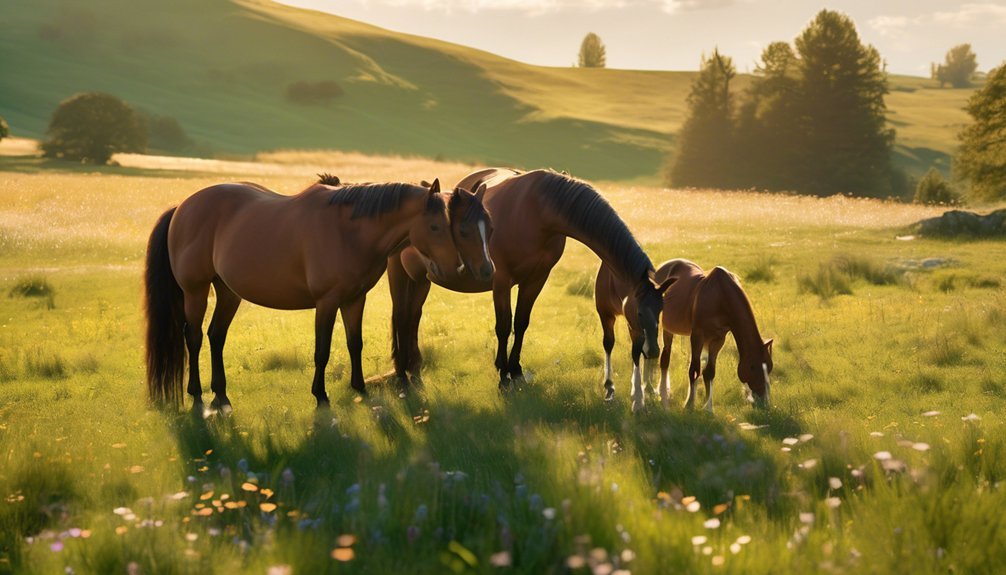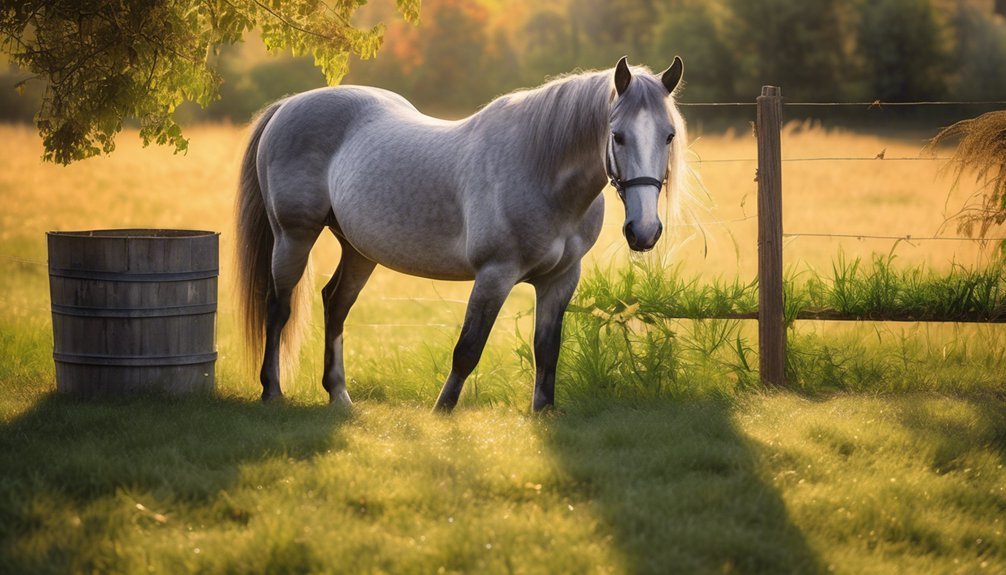
Managing the dietary needs of a horse with Cushing's disease can feel like navigating a complex puzzle. It's crucial to provide optimal nutrition while carefully controlling sugar intake to keep insulin levels stable. High-quality forage, such as mature grass hay, plays a vital role in this balance. But what specific practices can help you ensure your horse thrives while managing this condition? Let's explore the best feeding strategies that can make a difference.
Key Takeaways
- Prioritize high-quality grass hay over alfalfa to maintain low sugar levels and support gut health.
- Limit high-sugar feeds and select low-sugar concentrates specifically formulated for horses with Cushing's disease.
- Incorporate fortified supplements like Vitamin E and C, and omega-3 fatty acids to boost immunity and coat health.
- Maintain a consistent feeding schedule with multiple small meals to help regulate insulin levels effectively.
- Test hay for nutritional content and soak it to further reduce sugar concentrations as needed.
Understanding Cushing's Disease in Horses
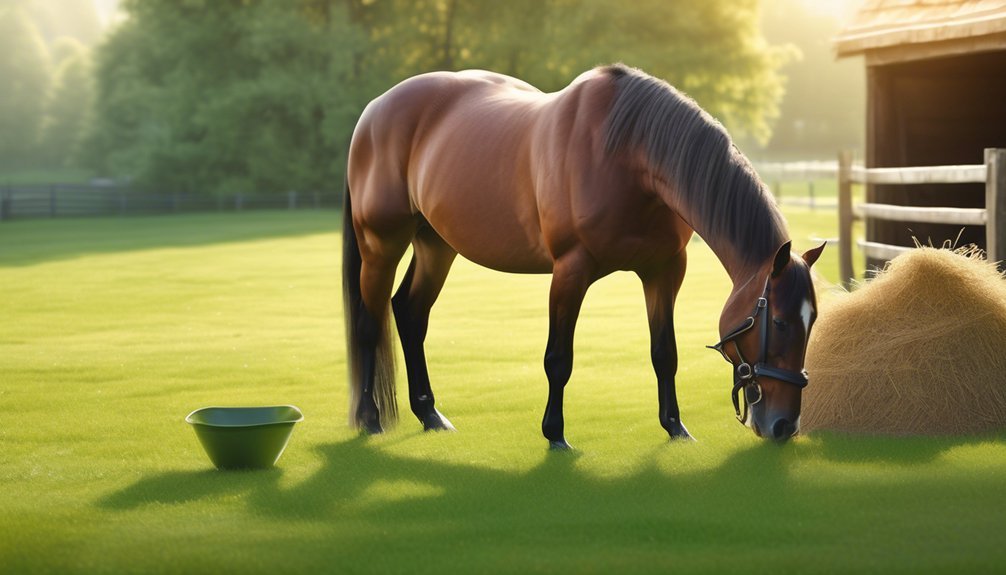
Although Cushing's disease, or pituitary pars intermedia dysfunction (PPID), primarily affects older horses, understanding its implications is crucial for any horse owner.
Cushing's symptoms often manifest as excessive thirst, increased urination, and a long, curly coat that fails to shed properly. These signs result from a hormonal imbalance caused by an overproduction of cortisol, which can significantly impact your horse's health.
You might also notice weight loss or muscle wasting, as well as a higher susceptibility to infections. Recognizing these symptoms early allows you to seek veterinary assistance and manage the condition effectively.
Importance of Nutrition in Managing Cushing's
Managing Cushing's disease in horses requires a keen focus on nutrition. Your horse's diet plays a crucial role in managing the condition and preventing nutritional deficiencies. Careful dietary adjustments can help maintain your horse's health and overall well-being.
| Nutritional Aspect | Impact on Cushing's | Recommended Adjustments |
|---|---|---|
| Fiber | Supports gut health | Increase forage intake |
| Sugar | Affects insulin levels | Limit high-sugar feeds |
| Vitamins & Minerals | Boosts immunity | Use fortified supplements |
Ideal Forage Options for Horses With Cushing's

When selecting forage for horses with Cushing's disease, it's essential to prioritize options that promote gut health while minimizing sugar intake. High forage quality is crucial, as it helps maintain digestive function and overall well-being.
Opt for hay types like grass hay, which generally contain lower sugar levels compared to alfalfa. Look for mature grass hays, as they tend to have reduced sugar content. Testing your hay for its nutritional profile can provide insight into its suitability.
Additionally, consider soaking hay to further decrease sugar concentrations. Always ensure your horse has access to clean, fresh water alongside forage to support hydration and digestion.
Selecting Low-Sugar Concentrates
After ensuring that forage options are suitable for horses with Cushing's disease, the next step is selecting low-sugar concentrates to complement their diet.
Choosing the right products can significantly impact your horse's health. Here are three key considerations:
- Look for Low Sugar Grains: Choose concentrates that contain low sugar grains, as these are gentler on insulin levels.
- Review Concentrate Brands: Investigate reputable concentrate brands that specifically cater to horses with metabolic issues.
- Check the Nutritional Label: Always read labels to ensure the sugar content is low and fiber content is adequate.
Balancing Nutritional Needs and Weight Management
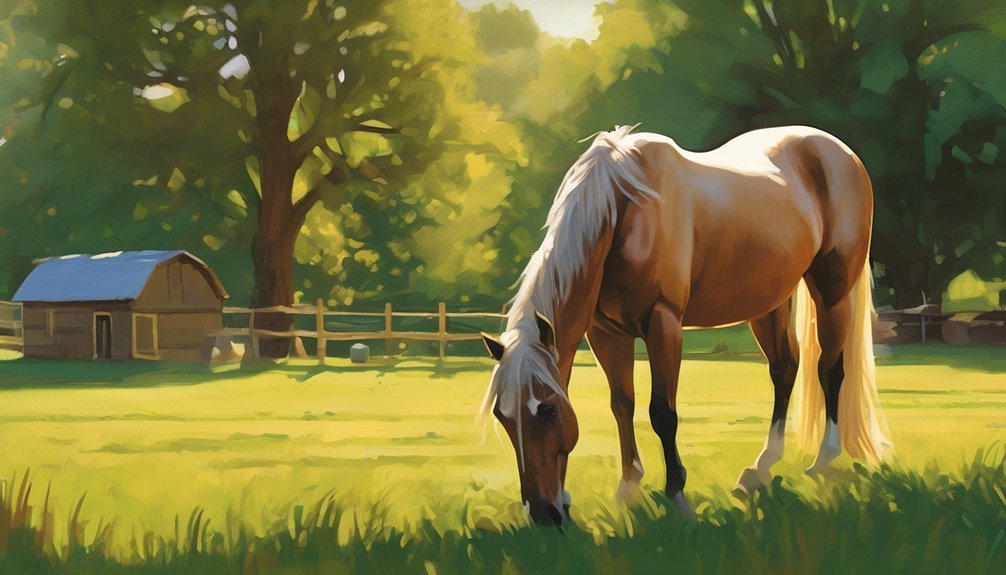
To effectively balance nutritional needs and weight management for horses, it's crucial to understand their unique dietary requirements.
Horses with Cushing's disease are susceptible to nutritional deficiencies, which can exacerbate their condition. You'll want to focus on providing a diet rich in fiber while minimizing sugars and starches to prevent weight fluctuations.
Incorporating high-quality hay and low-starch feeds can help maintain a healthy weight without compromising essential nutrients. Monitor your horse's body condition regularly, adjusting feed quantities as necessary to prevent obesity or underweight issues.
Supplements to Consider for Cushing's Horses
Considering the specific needs of horses with Cushing's disease, incorporating targeted supplements can significantly enhance their health and quality of life.
Here are three key supplements to consider:
- Vitamin Supplements: Vitamins E and C can support immune function and combat oxidative stress.
- Herbal Remedies: Adaptogenic herbs like Ashwagandha may help manage stress and improve overall vitality.
- Omega-3 Fatty Acids: These can promote healthy skin and coat while supporting anti-inflammatory responses.
Feeding Schedule and Portion Control
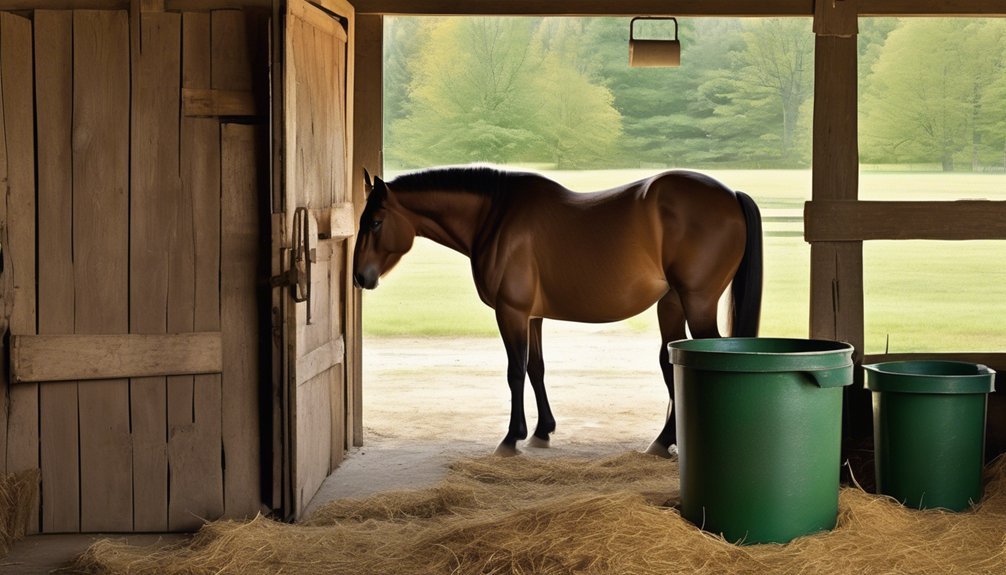
Establishing a consistent feeding schedule and controlling portion sizes are critical for maintaining the health of horses, especially those with specific conditions like Cushing's disease.
You'll want to aim for multiple small meals throughout the day, as this feeding frequency can help manage their insulin levels and overall metabolism. Dividing their daily ration into smaller portions not only prevents overeating but also promotes better digestion.
It's vital to measure portion sizes accurately to avoid excessive calorie intake, which can exacerbate symptoms. Regularly assessing your horse's condition will help you fine-tune their feeding schedule and portion sizes, ensuring they receive the best care possible.
Monitoring and Adjusting the Diet Over Time
As your horse's needs change over time, regularly monitoring and adjusting their diet becomes essential for optimal health.
To ensure your horse thrives, focus on these key aspects:
- Weight Monitoring: Regularly check your horse's weight using a weight tape. This helps you identify any weight loss or gain that may necessitate diet adjustments.
- Nutritional Evaluation: Assess the nutritional content of their feed periodically. As Cushing's disease progresses, your horse may require specific nutrients to manage symptoms effectively.
- Behavioral Changes: Observe any changes in your horse's eating habits or energy levels. These can signal the need for dietary modifications to maintain their overall well-being.
Frequently Asked Questions
Can Horses With Cushing's Disease Eat Fruits and Vegetables?
Yes, horses with Cushing's can eat fruits and vegetables, but you should focus on low-sugar options. Consider fruit selection carefully and enjoy the vegetable benefits to support their overall health while avoiding excessive sugars.
Are There Specific Feeding Times for Horses With Cushing's Disease?
You should establish specific feeding schedules for your horse, ensuring consistent meal frequency. Regular intervals help manage their condition, supporting digestion and nutrient absorption while promoting overall health. Consistency is key for optimal well-being.
How Can I Tell if My Horse Is Overweight?
Imagine feeling your horse's ribs like a gentle river beneath your fingertips. To assess body condition, check for excess fat deposits and ensure weight management aligns with ideal body score—aiming for a healthy balance.
What Signs Indicate My Horse's Diet Needs Adjustment?
If you notice dietary symptoms like weight loss, poor coat quality, or lethargy, your horse might have nutritional deficiencies. Regularly assess their body condition and energy levels to ensure their diet meets all their needs.
Can Cushing's Disease Affect My Horse's Drinking Habits?
Cushing's disease can alter your horse's drinking patterns, affecting hydration needs. You should monitor their water intake closely, as changes may indicate underlying issues. Ensuring proper hydration is crucial for their overall health and well-being.
Conclusion
In managing Cushing's disease in your horse, remember that nutrition is your steadfast ally. By providing high-quality forage, low-sugar concentrates, and tailored supplements, you can help your horse navigate the challenges of this condition. Just as a lighthouse guides ships safely home, your careful attention to their diet can lead to a healthier, happier life. Stay vigilant and adjust their feeding plan as needed, ensuring your equine companion thrives in the face of adversity.





